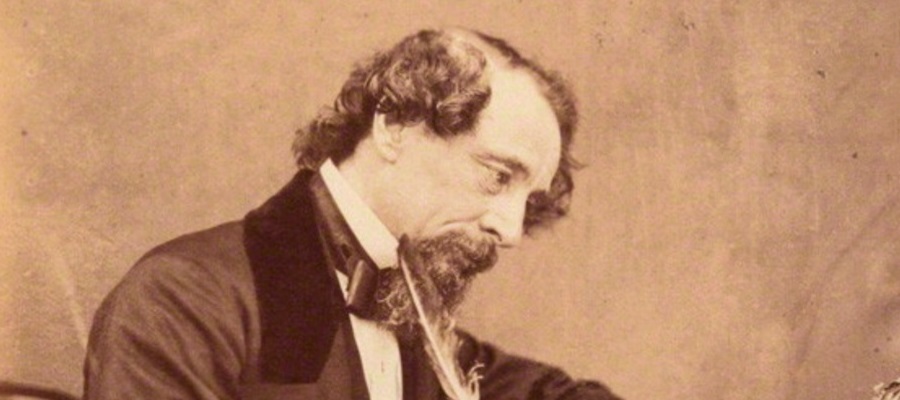Charles Dickens, one of the greatest English writers of all times, was born in Portsea, near Portsmouth. His father was a poor clerk in the Navy Pay Office. When Charles was nine, the family moved to London and Mr. Dickens very soon got into debt1. In those times people who were not able to pay their debts were sent to a prison called Marshalsea and Mr. Dickens was sent there, too.
The family was very poor then and young Charles had to work to earn some money for the family. After inheriting2 some money, Mr. Dickens was able to leave the prison and Charles went back to school for some time. When he was only fifteen he was taken into the office of a solicitor3 but he did not want to remain a lawyer’s clerk forever. He learned shorthand4 and became a newspaper reporter for The Morning Chronicle.
Charles Dickens started writing short stories as a boy at school. Like all people with some talent for writing he wanted to see his stories in print, so he sent some of them to a magazine. When he saw his first story published, it was a great day for him. After some time there were enough stories to compile5 a book “Sketches by Boz”. Boz was the pen name of Charles, although it was originally his brother’s nickname6.
His next work, which was published monthly, was “Pickwick Papers” or “The Posthumous Papers of the Pickwick Club”. This comic novel gave English literature some charming comic characters like Mr. Pickwick, a big middle aged and good-natured man, his servant Sam Weller who is typified by his common sense and wit7, the rascal Jingle and other members of the Pickwick Club.
When Charles Dickens was twenty-five years old, he gained fame and became one of the best known writers. As a rich man he married his first publisher’s daughter. They had nine children together. After a marriage lasting for more than twenty years, he shocked the Victorian England society by leaving his wife. Some recent literary scientists think the reason was his passionate, although secret, love for a young actress.
Charles Dickens hated the social system into which he was born. In his works he criticised and attacked many unpleasant aspects of contemporary8 England, e.g. bad schools and school masters (Nicholas Nickleby, Hard Times), the bad situation in prisons (David Copperfield, Little Dorrit), dirty houses (Oliver Twist, Great Expectations).
His well-known Oliver Twist is a novel about a poor orphan9 who was born in a workhouse. He runs away from an awful apprenticeship10, falls into the hands of a group of thieves11, later is rescued, kidnapped again by the gang and finally, after a lot of troubles, finds happiness and property which is left to him by his hitherto12 unknown parents. If you happened not to read it, you may have seen a film adaptation.
The Old Curiosity Shop (1841), Martin Chuzzlewit (1843-44), Bleak House (1852-53), Hard Times (1854) are some of his other novels.
Charles Dickens created various characters, e.g. thieves, murderers, men in debt, low class families, hungry people, poor orphans, hungry children and those whose priority was to deceive13 other people.
Many of his works have autobiographical features, e.g. the blacking warehouse14 where he had to work as a boy, the poor district of London, the Marshalsea prison, and so on. Dickens wrote also two historical novels, “Barnaby Rudge” and “A Tale of Two Cities”.
His novels were very well known in his lifetime and what is even more interesting, some prompted changes and improvements through legislation15.
In the last ten years of his life, Charles Dickens travelled a lot, giving public readings of his books. He travelled across England and America and his dramatic readings were very popular with the audience.
His books might seem a bit sentimental, simple and naive but they will remain gems16 of 19th century English literature.
Activities:
Which novel by Dickens have you read or seen a film version?
What are his masterpieces?
What negative aspects of the 19th century life did he depict in his novels?
What impact did he have on then existing school and judicial system?
Tatiana Filipoiu
Vocabulary: 1 dostal sa do dlhov – ocitl se v dluzích; 2 potom, čo zdedil – po zdědění; 3 právneho poradcu – právního zástupce; 4 stenografiu – těsnopis; 5 zostaviť – sestavit; 6 prezývka – přezdívka; 7 zdravý rozum a dôvtip – důvtip; 8 súčasnej – soudobé; 9 sirote – sirotku; 10 učňovania – učení; 11 zlodejov – zlodějů; 12 dovtedy; 13 oklamať – podvést; 14 sklad továrne na krém na topánky – sklad továrně na krém na boty; 15 urýchlili zmenu a zlepšenie cez legislatívu – urychlili změny a nápravu přes legislativu; 16 klenotmi

